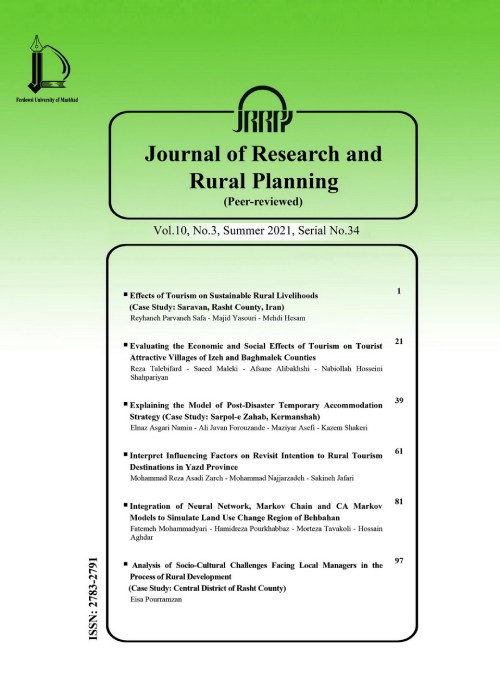Structural Equation Modeling of Factors Affecting Rural KnowledgeBased Realization (Case Study: Dekhkoda Village of Hamidieh County)
Today, many scholars believe that accelerating the exchange of knowledge and information with emphasis on the central role of knowledge and science is crucial to achieve comprehensive development. In fact, a knowledge-based society is recognized as a paradigm for development. Investing in knowledge-based foundations in the rural areas can also lead the rural community towards the future and play a role in national and international arenas. The purpose of this study is to model structural equations affecting knowledge-based realization in Dehkhoda Village in Hamidieh County.
The design of this study is of applied-theoretical type and adopts a descriptive-analytical research method. Research data were also extracted from library resources and field surveys. For this purpose, by visiting statistical centers and exploring through statistics, a comprehensive dataset was compiled for the research along with a self-administered questionnaire. The population of this study were the residents of Dehkhoda Village inhabiting permanently in this village in 2018 (n=1980). Of this statistical population, a sample size of n=321 was selected using Cochran formula for rural community. Pearson correlation coefficient, single sample T, multivariate regression and path analysis were used to analyze the data and test hypotheses. These tests were performed using SPSS.22 and Amos software.
The results suggested that information and communication technology (ICT), education, management, government agencies and NGOs (as independent variables) were positively and directly related to knowledge-based realization (as dependent variable) in Dehkhoda Village. SEM indicators also exhibited that the model developed in this study is backed up by the research data, with all indicators confirming the utility of the SEM. According to the results of research, it can be argued that public satisfaction with management indicators, government and non-governmental organizations is higher than average, whereas satisfaction with ICT and education is lower than average.
Rural knowledge-centeredness requires decentralization, reduction in government tenure, the reinforcement of voluntary and non-voluntary public institutions in villages, the modification of rural management laws and regulations to create and integrate rural management system, the assignment of a large portion of the government's executive duties and responsibilities to rural sheriffdom, and the transfer of facilities and financialresources to it.
- حق عضویت دریافتی صرف حمایت از نشریات عضو و نگهداری، تکمیل و توسعه مگیران میشود.
- پرداخت حق اشتراک و دانلود مقالات اجازه بازنشر آن در سایر رسانههای چاپی و دیجیتال را به کاربر نمیدهد.



